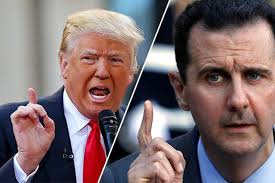Bashar al-Assad, with the support of his faithful, loyalist allies Russia and Iran, extends his tongue to Trump and agrees to the agreement signed between President Donald Trump and Vladimir Putin concerning the de-escalation zone in Southern Syria.
A few days ago, Bashar al-Assad's regime began a long-planned operation against opposition-controlled territory in the southern province of Daraa. So far, the regime’s regular army and elite forces known as the "Tiger Forces" have been involved in the fighting, along with a campaign of artillery and rocket fire. The regime has denied there is any foreign support being provided for the operations; however, there are assurances that Russian aviation is involved in the bombing, and that Hezbollah is engaged in fighting on the ground, disguised in regime uniform.
The Southern Front, the strongest opposition faction in the south, alongside the hardline jihadist and Salafist factions: Hay’at Tahrir Al-Sham, Jaysh al- Islam, and Ahrar Al-Sham has refused local reconciliation deals over the past few weeks and have seen such deals as merely forced surrender. However, the regime is likely to achieve success against the opposition, advancing within its territory and forcing it to surrender, perhaps in the coming weeks.
The opposition fighters have been completely left alone. The Trump administration, who some naive Syrians thought would be better than his predecessor Obama, has brazenly declared that "they will not help them against the regime" in the south, opposition sources said. But they sympathize with the Syrians, and understand "the difficult circumstances you are facing now", and they urged the Russians (Assad's allies) and the Syrian regime not to take any military action that violates the de-escalation zone in southwestern Syria.
The regime certainly has the ability to make rapid progress against the opposition that has lost the support of the United States and Jordan. As Jordan closes its borders, the opposition enclave in Daraa is effectively besieged.
However, the regime may slow down in its operations, fearing an Israeli reaction, and perhaps pairs the seizure of more opposition territory and offering reconciliation agreements that urge the opposition to surrender.
Reports last month said that Iran and Israel reached an agreement, mediated by Jordan, in which Iran agreed not to participate in the operations in Daraa, to avoid Israeli military reactions. However, the Iranian-backed militias have reportedly been among the forces involved in the Daraa attack in the past few days. Iran may be testing the waters, especially since the deal between it and Israel was private and informal.
If the Iranian-backed militias are already involved in the operations and approaching the Israeli border, Israel is likely to respond with airstrikes. These strikes may have a significant impact, as was the attack on Jun. 17, 2018, which killed dozens of regime fighters in Deir ez-Zor province, or the May 10, 2018, bombing that hit about 70 Iranian targets across the country. This reinforces our view that the regime is likely to continue its offensive in Daraa, but with some caution to control the situation, avoid excessive expansion towards the opposition and not rely on the support of Iranian militias.
The regime’s operations are likely to lead to significant displacement. Jordan is no longer allowing the use of its territory as a launching pad for offensive or defensive operations, and it will not allow additional combatants and refugees to withdraw to its territory. If Jordan refused to allow them to enter, most of the rebels, especially commanders and their families, would move to the governorates of Idleb and Aleppo.
After Daraa, the last major stronghold of the opposition will be the northwestern enclave, which includes parts of Idleb and Aleppo. Any attempts by the regime to regain control – through air or ground attacks – would be complicated by the presence of Turkish troops. How much Turkey can cooperate with the regime, will depend on how the regime deals with the Kurdish People's Protection Units (YPG) in the north, especially if the United States withdraws its forces, as we think it will. If the regime is able to contain and control the YPG, it is likely that Turkey will agree to an understanding with Damascus. If the regime allows the YPG to maintain its structures and semi-independence, it is likely that Turkey will continue to support the opposition and undermine the regime's efforts to restore that part of the country.
In short, President Trump's insidious reaction to the De-escalation Agreement will turn the tables in Syria. Trump and his aides have repeatedly bragged about reaching this agreement and considered it a sign of a victory for their diplomacy. But today they are watching the regime, the Russians and Iran, violating the agreement, without reaction and leaving the Syrians in the south of Syria, between a suicidal confrontation with the regime or a shameful surrender to it. The latter will only mean the abuse of the region and its people. Or else, the Syrians’ only exit for safety will be Israel. What a shame!
This article was translated and edited by The Syrian Observer. Responsibility for the information and views set out in this article lies entirely with the author.


